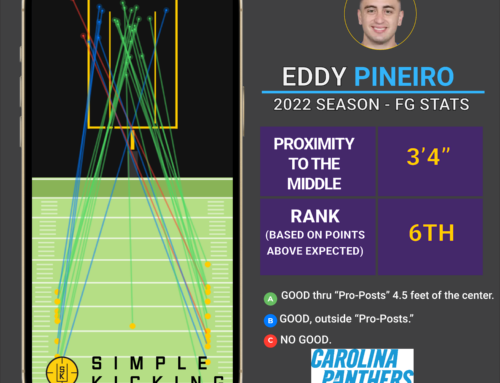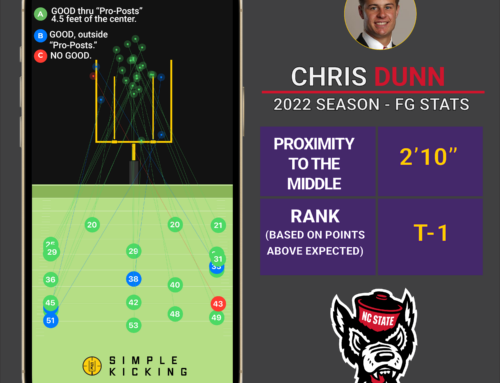Special Teams Roundtable #1, January 9, 2022: AFCA
The first Special Teams Roundtable revealed the importance of coaching. Two (2) of the panelists coached a pair of All-Americans over the last year. Not only do elite kickers share common characteristics, but so do elite coaches.
A big thanks to the panelists. 1) Louie Matsakis, Analyst – University of Kentucky, Drew Meyer, Analyst – University of Virginia 3) Brett Arkelian, Analyst – Virginia Tech 4) Grant Kurzner, Analyst – University of Missouri-Columbia
The most important takeaways:
- The key to coaching a kicker is to unlock their natural athletic ability and allow it to take over. 1B) The kicker’s personality and temperament determine how best to coach: a) like a caddie in golf, or b) aggressive, yelling, etc
- A coach can sense whether a kicker is ready or not, and it is his job to change the path a kicker’s mind is on, so that it flips it into thinking about something completely different.
- Each kicker is different: some are pensive and technique-oriented, others rely on feel, requiring little-to-no thinking.
- Asking for a kicker’s feedback after a shank does three things: a) creates conversation, b) identifies problem, c) creates space to move on and refocus.
- Coaches can identify the mental strengths of a high school kicker in recruiting but it requires the kicker to attend on-campus summer camp to be evaluated in-person.
- A high school kicker who makes excuses for a missed kick immediately is disqualified in recruiting.
- Hold tryouts for kicking, punting and long snapping in the offseason for emergencies!
- High school kickers who play multiple sports are more attractive because they have been exposed to more situations to winning because they play more games.
- Major problem: kickers lose strength throughout the season. Create a kicking schedule early so that a kicker can build capacity in Fall Camp.
- High school punters should chart at least 12 punts per day.
- High School Punters should be able to punt directionally left and right (between the numbers and the sideline)
- Fast hands = faster operation time, punters can speed up operation time by working on the jugs machine or Monarc Seeker.
- High school kickers need to focus on ball contact.
- Offseason is the time to do 3 things: 1) get stronger and faster, 2) work on the mental side of the game, 3) test and develop new techniques.
- Offseason is not the time to focus on results.
- Kickers who participate in team activities, volunteer with offense/defense find themselves gelling with the team as a whole, creating deep relationships later on.
- Some kickers react best when you treat them as a caddie manages a golfer. There are some kickers who react to tough coaching: getting them fired up, grabbing facemask, banging the helmet, etc.
- Kickers have methods to self-correct, but sometimes they need coaching to unlock their natural athletic ability to take over.
- Coaches are interested in how a high school kicker responds to adversity and missed kicks.
- Feedback that is important: how did you feel, why did you make or miss the kick, and write it down!
- Most coaches have to split time between various position groups and using tools like notes, charts, and graphs make it much easier to focus on the kickers.
- Do not make assumptions that your kicker knows how to stay warm during games. Create a plan, work it, and debrief to see how or if it worked.
- Chris Rubio’s four things he looks for in a long snapper, 1) big butt for balance, 2) huge head like physically large, 3) long arms, and 4) a little bit dumb.
Special Teams Roundtable #1, January 9, 2022: AFCA
The first Special Teams Roundtable revealed the importance of coaching. Two (2) of the panelists coached a pair of All-Americans over the last year. Not only do elite kickers share common characteristics, but so do elite coaches.
A big thanks to the panelists. 1) Louie Matsakis, Analyst – University of Kentucky, Drew Meyer, Analyst – University of Virginia 3) Brett Arkelian, Analyst – Virginia Tech 4) Grant Kurzner, Analyst – University of Missouri-Columbia
The most important takeaways:
- The key to coaching a kicker is to unlock their natural athletic ability and allow it to take over. 1B) The kicker’s personality and temperament determine how best to coach: a) like a caddie in golf, or b) aggressive, yelling, etc
- A coach can sense whether a kicker is ready or not, and it is his job to change the path a kicker’s mind is on, so that it flips it into thinking about something completely different.
- Each kicker is different: some are pensive and technique-oriented, others rely on feel, requiring little-to-no thinking.
- Asking for a kicker’s feedback after a shank does three things: a) creates conversation, b) identifies problem, c) creates space to move on and refocus.
- Coaches can identify the mental strengths of a high school kicker in recruiting but it requires the kicker to attend on-campus summer camp to be evaluated in-person.
- A high school kicker who makes excuses for a missed kick immediately is disqualified in recruiting.
- Hold tryouts for kicking, punting and long snapping in the offseason for emergencies!
- High school kickers who play multiple sports are more attractive because they have been exposed to more situations to winning because they play more games.
- Major problem: kickers lose strength throughout the season. Create a kicking schedule early so that a kicker can build capacity in Fall Camp.
- High school punters should chart at least 12 punts per day.
- High School Punters should be able to punt directionally left and right (between the numbers and the sideline)
- Fast hands = faster operation time, punters can speed up operation time by working on the jugs machine or Monarc Seeker.
- High school kickers need to focus on ball contact.
- Offseason is the time to do 3 things: 1) get stronger and faster, 2) work on the mental side of the game, 3) test and develop new techniques.
- Offseason is not the time to focus on results.
- Kickers who participate in team activities, volunteer with offense/defense find themselves gelling with the team as a whole, creating deep relationships later on.
- Some kickers react best when you treat them as a caddie manages a golfer. There are some kickers who react to tough coaching: getting them fired up, grabbing facemask, banging the helmet, etc.
- Kickers have methods to self-correct, but sometimes they need coaching to unlock their natural athletic ability to take over.
- Coaches are interested in how a high school kicker responds to adversity and missed kicks.
- Feedback that is important: how did you feel, why did you make or miss the kick, and write it down!
- Most coaches have to split time between various position groups and using tools like notes, charts, and graphs make it much easier to focus on the kickers.
- Do not make assumptions that your kicker knows how to stay warm during games. Create a plan, work it, and debrief to see how or if it worked.
- Chris Rubio’s four things he looks for in a long snapper, 1) big butt for balance, 2) huge head like physically large, 3) long arms, and 4) a little bit dumb.
Love us? Follow Us!
Sign Up for the
Simple Kicking Mail List
The Simple Kicking weekly newsletter provides the latest special teams news, updates,
podcast releases, and videos right to your inbox!






